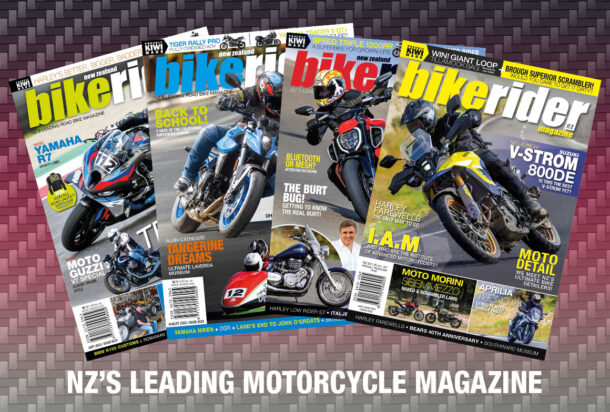Kerry spends a day on the Ride Forever Bronze Course in preparation for a summer on two-wheels…
Words: Kerry Pics: Paul
Well, over a year has passed since I sat my learner bike licence, which I then quickly followed by doing an ACC-funded Ride Forever Bronze Course. Annoyingly, I haven’t made it to the next step yet of going for my restricted licence… why? Finding the time amongst family, work commitments – yeah, it’s frustrating how work always tends to get in the way of riding, huh? – and good old winter temps has seen progress slow down a little.
So, with the rays of spring coming through, the effort has been put back into full swing to get this ball rolling, once again. Since my last Bronze course, there was a decent gap, so it made perfect sense to redo it and blow the cobwebs out before a summer of fun. Since ACC funds riders to attend this one twice, I was glad to sign up for a second time and only pay the bargain price of $20.
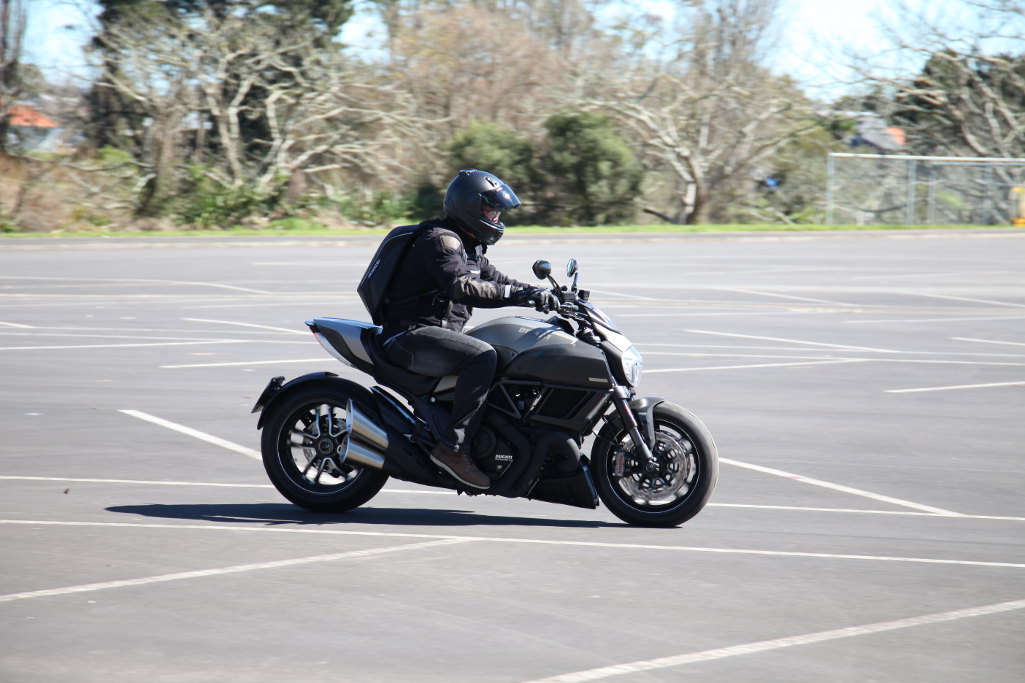 The main idea of the Bronze course is to not only take you through all the basic things that will keep you safe and alive when new to riding, but also as a way for the Pro Rider instructor to identify what areas of your riding you need to practice and improve on in order to be able to move to the next stage of gaining your restricted licence.
The main idea of the Bronze course is to not only take you through all the basic things that will keep you safe and alive when new to riding, but also as a way for the Pro Rider instructor to identify what areas of your riding you need to practice and improve on in order to be able to move to the next stage of gaining your restricted licence.
The day arrived and Paul and I headed into Hamilton to meet up with the other four riders in our group. We were very fortunate to have a beautiful and somewhat uncharacteristic, sunny spring day to do our training, with the Waikato almost drowning under the rain we’ve experienced (since winter supposedly finished). Our day began with a hot drink at McDonald’s and then an introduction to our Bike Trainer, Ken Nightingale, who ran us through all of what we were to expect throughout the day and showed us some basic riding technique safety videos – the techniques that we would all be encouraged to apply in our day of riding.
First up was a check over the bikes, something you’d be expected to do when sitting your CBTA. So, it’s a case of tyres, chain adjustment and a general onceover to confirm the machine is roadworthy and safe. Then, we were set up with headsets, which allowed us to get instructions from Ken directly, about our riding techniques and where he wanted us to move positions on the road within our group. For some, the prospect of riding in a group is completely foreign and quite stressful, so Ken explained how we needed to sit in a staggered formation to give maximum vision for everybody and also to reduce the chances of running into the back of one another! If you haven’t tried it, give it a go – it works extremely well.
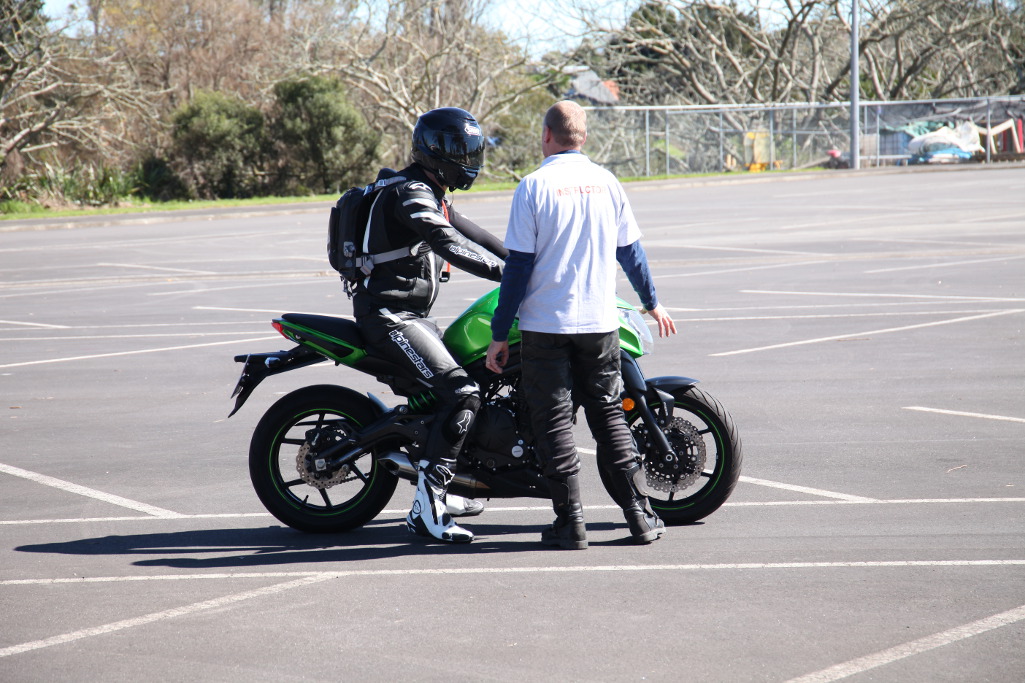 Despite a bit of varying abilities in the group (two were newbies and two full licence holders), the training ride was relaxed and easy, with the first stop being an empty car park where we practised slow speed riding first, followed by emergency braking. I don’t have much trouble with slow-speed riding, as I’m used to riding dirt bikes where you often have to ride slowly while standing on the pegs, but Ken taught us about simply having the bike at tickover and using the clutch to modulate your speed. It worked well, too, and before long we were all riding at walking pace. Then it was time for emergency stops, which slightly easier, nowadays, since most bikes have ABS brakes that negates the chance of skidding. Still, it’s still an invaluable exercise.
Despite a bit of varying abilities in the group (two were newbies and two full licence holders), the training ride was relaxed and easy, with the first stop being an empty car park where we practised slow speed riding first, followed by emergency braking. I don’t have much trouble with slow-speed riding, as I’m used to riding dirt bikes where you often have to ride slowly while standing on the pegs, but Ken taught us about simply having the bike at tickover and using the clutch to modulate your speed. It worked well, too, and before long we were all riding at walking pace. Then it was time for emergency stops, which slightly easier, nowadays, since most bikes have ABS brakes that negates the chance of skidding. Still, it’s still an invaluable exercise.
Once again, Ken gave us his wisdom by teaching us to first pull the lever slightly to compress the front forks before then pulling it full, a two-stage braking technique. Unbeknown to us, simply “grabbing a handful” doesn’t always give maximum braking as there’s no pressure downwards to push the front tyre into the tarmac, so we were all pleased to learn and practise this style of stopping fast.
Next up, it was out into the traffic, which I have to say was absolutely crazy in Hamilton. But there’s nothing like jumping in at the deep end to improve your skills. We did a number of “laps” of an inner city route that saw us negotiating roundabouts, traffic lights and filtering, all while making sure we were scanning intersections, looking over our shoulders to cover our blind-spots and indicating at the correct points. It is a busy time but after a while negotiating the urban jungle, it quickly becomes second nature.
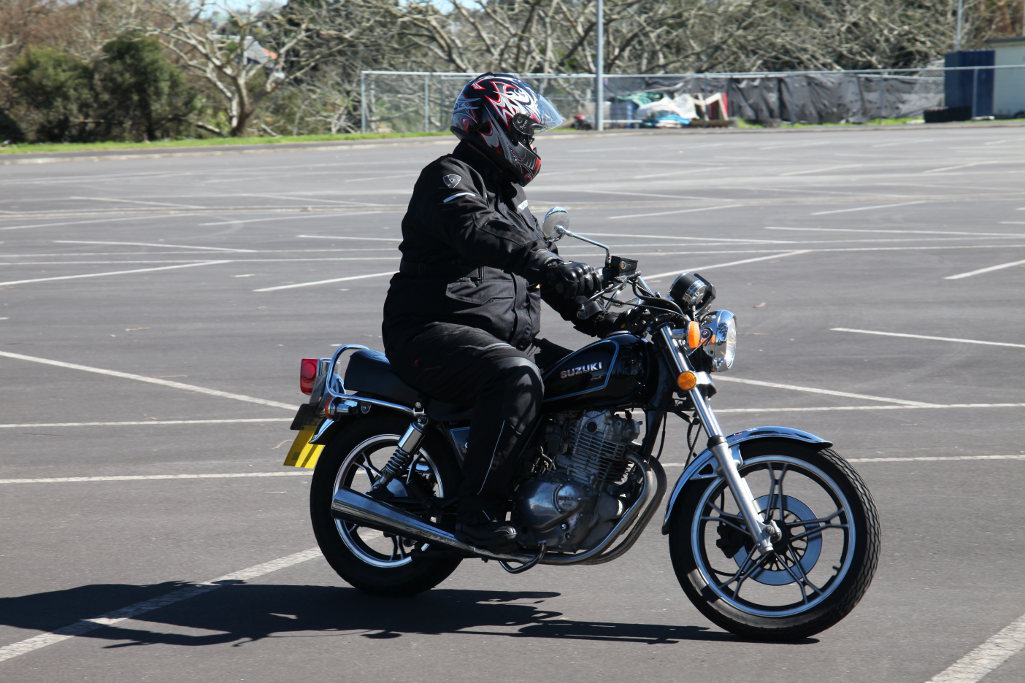 After lunch at the Jukebox Diner, which was rather cool, we headed out to the open road where we all had turns attempting a variety of on road riding styles, while still benefitting from watching the other members of the group attempt various skills. With road positioning, looking ahead and through, corners combined with the continuous scanning of intersections that gets drummed into you, it didn’t take long before everyone was looking a heap more confident on two-wheels and carving through corners like seasoned motorcyclists. And with our new appreciation of scanning for hazards, combined with the tools required to scrub speed off in a hurry if needed in an emergency, we were all feeling much more confident about our own skills as motorcyclists.
After lunch at the Jukebox Diner, which was rather cool, we headed out to the open road where we all had turns attempting a variety of on road riding styles, while still benefitting from watching the other members of the group attempt various skills. With road positioning, looking ahead and through, corners combined with the continuous scanning of intersections that gets drummed into you, it didn’t take long before everyone was looking a heap more confident on two-wheels and carving through corners like seasoned motorcyclists. And with our new appreciation of scanning for hazards, combined with the tools required to scrub speed off in a hurry if needed in an emergency, we were all feeling much more confident about our own skills as motorcyclists.
By the end of the day, I was able to take away more skills of how to ride better and safer; I believe the training would be a huge boost to any rider’s confidence level. Thanks to Pro Rider for the day and if you feel like you could learn something to make your life on the road safer, visit www.prorider.co.nz
WHY DO BRONZE?
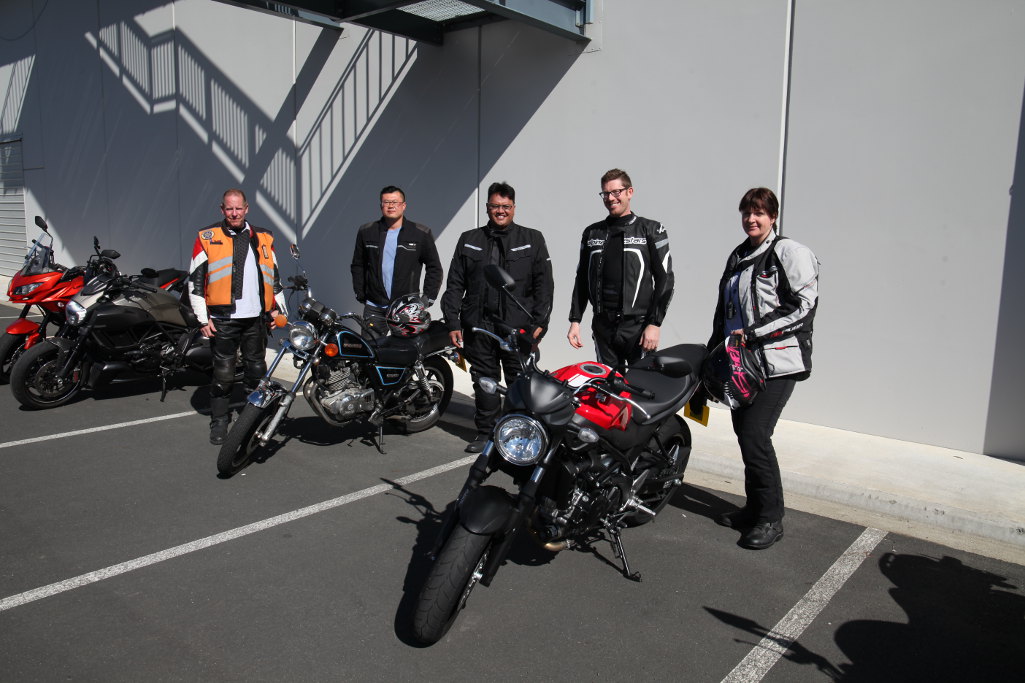 Participating in the Bronze course highlights to the instructor any bad habits you have formed in your riding career. Let’s face it: most of us either didn’t have any formal instruction or, if we did, we have forgotten it. With the advice from the instructor, it enables you to start learning some new – or maybe improved – techniques to use while out riding on the road, which can only make you a safer, better rider. It’s easy to pick up the bad habits from those who actually taught us, rather than using the techniques of a proper instructor, so the good old saying “when you know better, you do better” can have some serious benefits as a motorcyclist.
Participating in the Bronze course highlights to the instructor any bad habits you have formed in your riding career. Let’s face it: most of us either didn’t have any formal instruction or, if we did, we have forgotten it. With the advice from the instructor, it enables you to start learning some new – or maybe improved – techniques to use while out riding on the road, which can only make you a safer, better rider. It’s easy to pick up the bad habits from those who actually taught us, rather than using the techniques of a proper instructor, so the good old saying “when you know better, you do better” can have some serious benefits as a motorcyclist.






